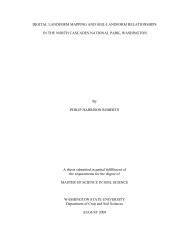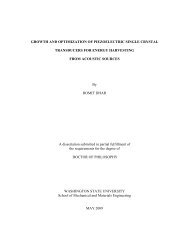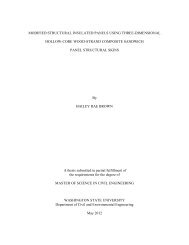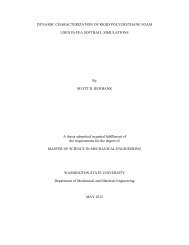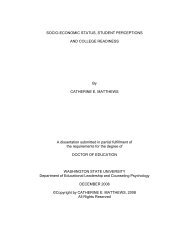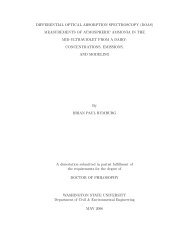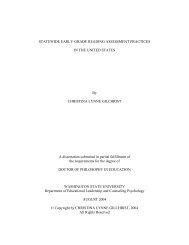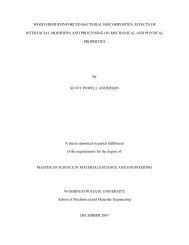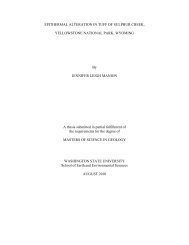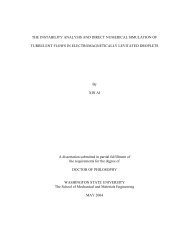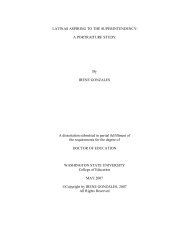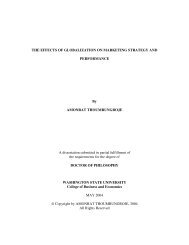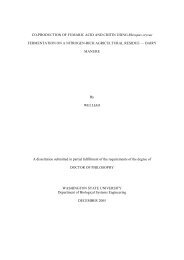the moral reasoning of student athletes and athletic training students
the moral reasoning of student athletes and athletic training students
the moral reasoning of student athletes and athletic training students
You also want an ePaper? Increase the reach of your titles
YUMPU automatically turns print PDFs into web optimized ePapers that Google loves.
Thus, attempting to identify when <strong>athletes</strong> may choose to begin doping as well as <strong>the</strong><br />
reasons underlying those choices may require an instrument specific to <strong>the</strong> <strong>moral</strong> <strong>reasoning</strong> <strong>of</strong><br />
doping in sport. Additionally, knowing more about how <strong>student</strong> <strong>athletes</strong> <strong>and</strong> <strong>athletic</strong> <strong>training</strong><br />
<strong>student</strong>s reason about performance enhancing drugs may help in designing effective educational<br />
strategies to address doping in sport.<br />
Over <strong>the</strong> past 20 years, researchers have found that <strong>athletes</strong> are significantly more<br />
affected by <strong>the</strong> competitive experience compared to those not engaged in <strong>the</strong>se high levels <strong>of</strong><br />
sport. According to <strong>the</strong>se researchers, much evidence exists to suggest that <strong>athletes</strong> are generally<br />
less developed in <strong>the</strong>ir processes <strong>of</strong> <strong>moral</strong> <strong>reasoning</strong> than non-<strong>athletes</strong> (Beller & Stoll, 1993;<br />
Beller, 1990; Hahm, 1989; Beller & Stoll, 1995; Beller, Stoll, Burwell & Cole, 1996; Rudd &<br />
Stoll, 1998; Stoll & Beller, 1998). Moreover, it appears that <strong>the</strong> longer <strong>athletes</strong> participate in<br />
sport, <strong>the</strong> less <strong>moral</strong>ly reasoned <strong>the</strong>y become. It has been said that individuals can become<br />
hardened to identifying <strong>moral</strong> issues <strong>and</strong> tend to reason from an egoistic perspective where <strong>the</strong>ir<br />
own self interests <strong>and</strong> desires drive <strong>the</strong>ir decision making (Beller, Stoll, & Hansen, 2004;<br />
Kretchmar, 1995). Notions about o<strong>the</strong>rs, social rules, laws, <strong>and</strong> principles have little value or<br />
merit in decision making. They tend to see <strong>the</strong>ir opponents as objects ra<strong>the</strong>r than as people<br />
(Lumpkin, Stoll, & Beller, 2003). Unfortunately, much time is spent in sport developing <strong>athletes</strong>’<br />
bodies, physical skills <strong>and</strong> abilities <strong>and</strong> little, if any, time on <strong>the</strong>ir development <strong>of</strong> character.<br />
While <strong>the</strong> HBVCI is a valid <strong>and</strong> reliable tool for measuring general <strong>moral</strong> <strong>reasoning</strong> in<br />
sport, some have argued that it would be <strong>of</strong> benefit to examine how individuals reason relative to<br />
specific issues in sport such as doping (Stoll, Gwebu, & Beller, 2006). Knowing more about <strong>the</strong><br />
underlying <strong>reasoning</strong> behind doping may provide researchers a better insight into decisions to<br />
8



